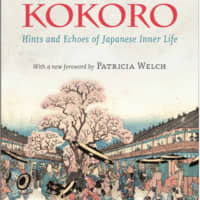Published six years after his arrival in the country in 1890, "Kokoro" was the third volume of essays on Japan by the prolific Anglo-Irish author Lafcadio Hearn. This collection teems with a diverse panorama of observations, offering snapshots of the country taken in the period of swelling national pride that followed victory in the First Sino-Japanese War.
Kokoro: Hints and Echoes of Japanese Inner Life, by Lafcadio Hearn.
256 pages
TUTTLE PUBLISHING, Essays.
Heavily influenced by Herbert Spencer's evolutionary psychology, and excited by Japan's unique heritage and future prospects, Hearn's constant race-based analysis of culture jars somewhat with modern sensibilities. But his deft portraits of the daily world around him — from an account of a blind singer of astonishing talent performing at his house to a depiction of a long-suffering Japanese wife — are a constant delight.
Hearn had a fearlessly inquisitive mind that often stops you dead with the originality of his musings; he notes that Japanese crowds are the sweetest smelling in the world and wonders whether the curve of Japanese roofs was a distant echo of tents from a pre-historic nomadic past. He is curiously prescient, both of future war with Russia and that Japan's economy, putting to good use the sophistication of its craft traditions, would ultimately not be based on undercutting European rivals but on high-tech manufacturing.
When not penning his observations, travels and historico-cultural analysis, Hearn switches to passages of novelistic invention, as if crafting an inspirational gothic fantasy out of Japan that will take him to the heart ("kokoro") of the mystery of human existence.


















With your current subscription plan you can comment on stories. However, before writing your first comment, please create a display name in the Profile section of your subscriber account page.